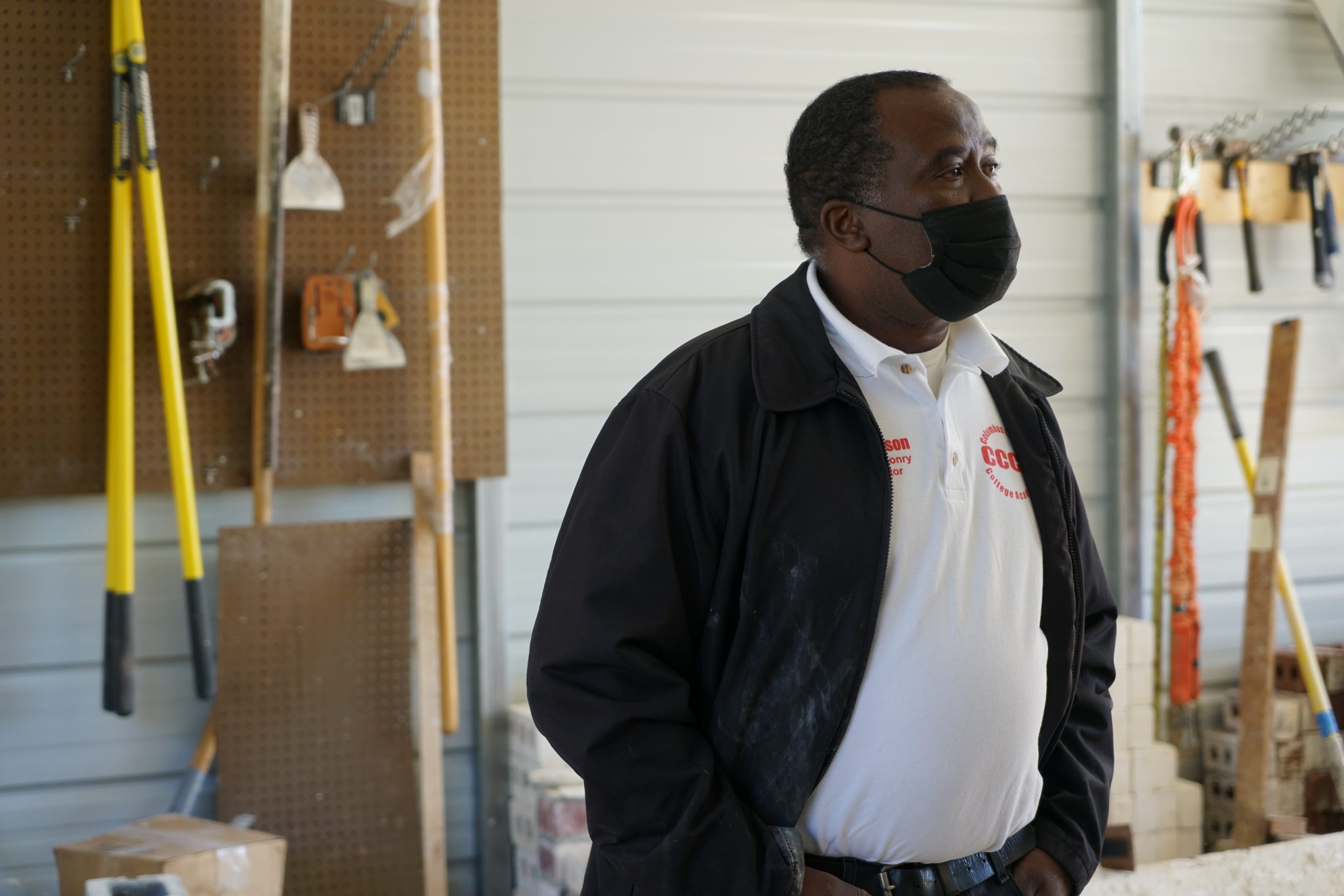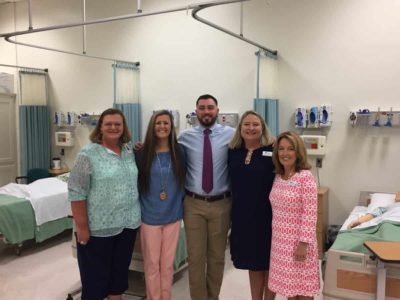
Chris English has a burning ambition for Southeastern Community College: Getting Columbus County back to work.
English became president of Southeastern Community College (SCC) in August 2020. SCC’s campus sits just outside of downtown Whiteville. Whiteville, a town of just over 5,000 residents, is the county seat for Columbus County. The county, on the Carolinas state line, had 56,424 residents as of 2018. And it had an unemployment rate of just over 7% in November, compared with a statewide rate of 6.2%.
While the spike in unemployment has been fueled, in large part, by COVID-19, Columbus County has struggled for decades, several community leaders told us during our recent visit.
Our visit kicked off with a wide-ranging, hour long conversation with English along with Theresa Blanks, Judge Jack Hooks, and Crystal Frink, who serve on the SCC Board of Trustees.
“One big question is on our mind every single day: How do we get this county back to work?” English said as we began.
Blanks, Frink, and Hooks outlined the county’s economic trajectory. They pointed to a poverty rate of more than 22%, a child poverty rate that exceeds 30 percent, and a steady departure of textile mills and clothing companies over the past four decades as persistent reasons for concern.
“Back in the early 1980s when I moved back home, textile and cotton mills, and what we called rag factories, were everywhere,” Hooks said. “We had community banks and local businesses that kept higher-income people in our community. And then the banks merged, and were acquired, and the high-income folks began to leave. At the same time, NAFTA hit and the mills began to either move or close.”
Hooks went on to say with a wry laugh, “I’ve talked myself into a depression.”
The key for the county’s future, the trustees and leadership of the college agreed, is to both educate the youth of the county and give them a reason to live there.
As we walked through campus, we saw evidence of the challenge for the community.
We walked into a class full of students in the Advanced Manufacturing Center and asked them about their aspirations. Many expressed a desire to turn their eventual credential or degree in HVAC into well-paying jobs that would lead to ownership of their own businesses. They were all optimistic about their future, but only one of the dozen students expressed any intent to stay in Columbus County long-term.
On the other end of the spectrum, we had a chance to spend time with Anthony Brown. Brown, an SCC graduate, had begun his higher education career at UNC Pembroke before circumstances led him home. He then experienced the devastating impact of hurricanes Matthew and Florence on his home community of Fair Bluff.
He described his experience with the flood starkly: “Matthew’s devastation was just so much, too much really. I remember watching the water rise. I remember wondering how we might get out. I remember thinking and praying that we would survive.”
And while Brown recalled how his family ultimately found safe harbor at a local shelter, he shook his head as he mournfully said, “We just had so much loss at one time.”
His path wasn’t easy, but he told us that SCC pushed him to try harder at life and work. He said he received so much help from so many people on the campus that he couldn’t help but feel at home — and he credited that spirit and culture as the reason he became a campus leader, serving in the Student Government Association and helping to launch a permanent food pantry on the campus.
Brown now works at Atlantic Packaging in nearby Tabor City and told us he intends to stay in Columbus County.
Sign up for Awake58, our newsletter on all things community college.
What does the future hold for Columbus County? And what role will SCC play?
The trustees, and other community leaders who joined us throughout the day, expressed optimism despite the statistics and sobering stories they shared. They pointed to a range of factors they said would make a difference for their county in time, ranging from the growth of Wilmington and the Triangle to the county’s affordability.
The one common factor they said could make a difference? Their community college.
Trustee Theresa Blanks said it plainly: “If it weren’t for SCC, our young people wouldn’t have a starting path for higher education.”
And yet COVID-19 and its impact on enrollment and other services, including SCC’s inability to serve basic skills courses to inmates because the local prison barred outsiders, could have a dire short-term impact on the college, English said.
Watch the video below for details.
English also pointed out that beyond his call for budget stabilization for the community college system, he hopes to see faculty pay increase in the next legislative session as he continues to try to recruit and retain talented faculty to lead SCC’s short-term workforce development programs and curriculum courses alike.
Watch the video below as English makes his case for faculty raises.
English and his team expressed optimism that the college will survive the pandemic — and ultimately play a leading role in the economic revival of Columbus County.
As we walked the campus, English ran through a long list of ideas for iterating existing programs, as well as ideas for launching initiatives he believes would expand opportunities for students if the school can identify the resources. He spoke of the potential of collaborations, including with nearby Brunswick Community College. And he expressed confidence in the resilience of his staff and the community.
English noted that he, along with his peers leading colleges across the state, will be monitoring the upcoming legislative session and making the case for the resources they believe they need to not only survive the pandemic, but to provide a path forward for the economic future of their community.
Below you will find the myFutureNC county data profile for Columbus County.
Recommended reading

